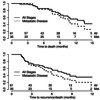Multi-Institutional Experience with FOLFIRINOX in Pancreatic Adenocarcinoma
Abstract
Context Combination chemotherapy with FOLFIRINOX (oxaliplatin, irinotecan, fluorouracil, and leucovorin) was shown to be effective in a large phase III trial. Objective The purpose of this study was to examine the tolerance and effectiveness of FOLFIRINOX as practiced outside of the confines of a clinical trial and to document any dose modifications used by practicing oncologists. Methods Data on patients with all stages of pancreatic adenocarcinoma treated with FOLFIRINOX at three institutions was analyzed for efficacy, tolerance, and use of any dose modifications. Results Total of 61 patients was included in this review. Median age was 58 years (range: 37 to 72 years), 33 were male (54.1%) and majority had ECOG performance of 0 or 1 (86.9%, 53 patients). Thirty-eight (62.3%) had metastatic disease, while 23 (37.7%) were treated for locally advanced or borderline resectable disease. Patients were treated with a median number of four cycles of FOLFIRINOX, with dose modifications in 58.3% (176/302) of all cycles. Ten patients had stable disease (16.4%), four had a partial response (6.6%) while eight had progressive disease (13.1%) on best imaging following therapy. Median progression-free survival and overall survival were 7.5 months and 13.5 months, respectively. The most common grade 3-4 adverse event was neutropenia at 19.7% (12 cases), with 4.9% (3 cases) rate of febrile neutropenia. Twenty-one patients (34.4%) were hospitalized as a result of therapy but there were no therapy-related deaths. Twenty-three (37.7%) had therapy eventually discontinued as a result of adverse events. Conclusion Despite substantial rates of adverse events and use of dose modifications, FOLFIRINOX was found to be clinically effective in both metastatic and non-metastatic patients. Regimen toxicity did not detract from overall response and survival.
Image: Overall and progression free survival in all patients and subset with metastatic disease.
Downloads
References
Siegel R, Naishadham D, Jemal A. Cancer statistics, 2012. CA: A Cancer Journal for Clinicians. 2012; 62(1):10-29.
Burris HA 3rd, Moore MJ, Andersen J, et al. Improvements in survival and clinical benefit with gemcitabine as first-line therapy for patients with advanced pancreas cancer: a randomized trial. J Clin Oncol 1997; 15(6):2403-13.
Di Marco M, Di Cicilia R, Macchini M, et al. Metastatic pancreatic cancer: is gemcitabine still the best standard treatment? (Review). Oncol Rep 2010; 23(5):1183-92.
Philip PA, Benedetti J, Corless CL, et al. Phase III study comparing gemcitabine plus cetuximab versus gemcitabine in patients with advanced pancreatic adenocarcinoma: Southwest Oncology Group-directed intergroup trial S0205. J Clin Oncol 2010; 28(22):3605-10.
Kindler HL, Niedzwiecki D, Hollis D, et al. Gemcitabine plus bevacizumab compared with gemcitabine plus placebo in patients with advanced pancreatic cancer: phase III trial of the Cancer and Leukemia Group B (CALGB 80303). J Clin Oncol 2010; 28(22):3617-22.
Moore MJ, Goldstein D, Hamm J, et al. Erlotinib plus gemcitabine compared with gemcitabine alone in patients with advanced pancreatic cancer: a phase III trial of the National Cancer Institute of Canada Clinical Trials Group. J Clin Oncol 2007; 25(15):1960-6.
Conroy T, Desseigne F, Ychou M, et al. FOLFIRINOX versus gemcitabine for metastatic pancreatic cancer. N Engl J Med 2011; 364(19):1817-25.
Falcone A, Ricci S, Brunetti I, et al. Phase III trial of infusional fluorouracil, leucovorin, oxaliplatin, and irinotecan (FOLFOXIRI) compared with infusional fluorouracil, leucovorin, and irinotecan (FOLFIRI) as first-line treatment for metastatic colorectal cancer: the Gruppo Oncologico Nord Ovest. J Clin Oncol 2007; 25(13):1670-6.
DCTD, NCI, NIH, DHHS. Cancer Therapy Evaluation Program, Common Terminology Criteria for Adverse Events, Version 3.0. 2006. http://ctep.cancer.gov/protocolDevelopment/electronic_applications/
docs/ctcaev3.pdf
Assaf E, Verlinde-Carvalho M, Delbaldo C, et al. 5-fluorouracil/leucovorin combined with irinotecan and oxaliplatin (FOLFIRINOX) as second-line chemotherapy in patients with metastatic pancreatic adenocarcinoma. Oncology 2011; 80(5-6):301-6.
Hosein PJ, Macintyre J, Kawamura C, et al. A retrospective study of neoadjuvant FOLFIRINOX in unresectable or borderline-resectable locally advanced pancreatic adenocarcinoma. BMC Cancer 2012; 12(1):199.
Howlader N, Noone A, Krapcho M, Neyman N, Aminou R. SEER Cancer Statistics Review 1975-2009 (Vintage 2009 Populations). Available at: http://seer.cancer.gov/csr/1975_2009_
pops09/index.html. Accessed May 10, 2012.
Von Hoff DD, Ramanathan RK, Borad MJ, et al. Gemcitabine plus nab-paclitaxel is an active regimen in patients with advanced pancreatic cancer: a phase I/II trial. J Clin Oncol 2011; 29(34):4548-54.

Copyright (c) 2014 Parvin Fatheddin Peddi, Sam Lubner, Robert McWilliams, Benjamin R Tan, Joel Picus, Steven M Sorscher, Rama Suresh, A Craig Lockhart, Jian Wang, Christine Menias, Feng Gao, David Linehan, Andrea Wang-Gillam

This work is licensed under a Creative Commons Attribution 4.0 International License.
As a member of Publisher International Linking Association, PILA, iMedPub Group’s JOP follows the Creative Commons Attribution License and Scholars Open Access publishing policies. Journal of the Pancreas is the Council Contributor Member of Council of Science Editors (CSE) and following the CSE slogan Education, Ethics, and Evidence for Editors.